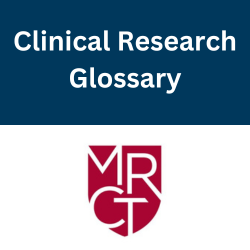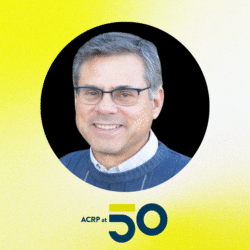Research assistants, clinical research coordinators, and other clinical research professionals are often the study team members with whom participants (and potential participants) interact the most when joining or learning about a research study, throughout their participation, and whenever they have questions. During the recruitment and consent process, as well as during the study, participants should be supported with clear explanations of what specific clinical research terms mean.
To that end, The Multi-Regional Clinical Trials Center (MRCT Center) of Brigham and Women’s Hospital and Harvard has introduced the Clinical Research Glossary (CRG), which offers plain language definitions along with additional contextual information that research professionals can use to empower participants and their families.
The availability of these definitions for all sites and sponsors to use allows for a harmonized approach across the research ecosystem, increasing the likelihood of consistency in terminology across the study life cycle itself, and even between studies. This supports participants and the research enterprise, countering research misinformation and increasing researcher trustworthiness.
Some key facts about the MRCT Center’s Clinical Research Glossary:
- The CRG is freely available and aims to provide clear definitions in plain language and helpful extra content (e.g., graphics and additional information for potential participants to consider when joining a study), so each concept is easier for every person to understand.
- The CRG definitions have been included by the Clinical Data Interchange Standards Consortium (CDISC) in its global clinical research standards, so more and more research leaders are turning to these definitions.
- Every definition was co-created by the MRCT Center and a workgroup made up of volunteers with expertise across the clinical research ecosystem. We prioritize the patient voice and research advocates, while also drawing on the experience of medical writers, librarians, other nonprofit professionals, and sponsor representatives. Some of these definitions were even reviewed by fifth graders to ensure clarity of information.
- Most terms found in the CRG have a bespoke image designed by the MRCT Center team, produced by graphic designers, and reviewed by the team of volunteers. The extra information goes through a similar process of multiple reviews before it is published on the website.
- The MRCT Center will update the CRG over time, adding new words and refreshing old content as needed.
This tool can be implemented in various ways:
- Use the CRG for onboarding to familiarize new staff with key clinical research terminology.
- Print the CRG as a PDF for use during recruitment, consent, and study visits.
- Incorporate CRG information into educational materials to aid participants in following study instructions and facilitate conversations.
- Download the CRG as an Excel file to integrate with other site lexicons.
- Provide the CRG to participants as an educational resource, either via link or on a study-specific website.
As long as the Creative Commons license is followed, anyone can reuse the content and graphics.
While we welcome all participation, we are especially grateful for the perspective of research professionals with direct, frequent participant engagement. Specifically, please share with us terms that need to be clarified or added to the CRG.
What Makes the MRCT Center’s Clinical Research Glossary Different
All words and definitions undergo a rigorous Public Review process governed by CDISC, ensuring that the CRG is a global standard. This annual process occurs every June and is open now from June 7 to July 5. Contribute to the vital process by clicking here for the Public Review survey.
Summary
The MRCT Center Clinical Research Glossary is designed for patients, participants, their caregivers, and clinical research professionals. Use this resource to supplement your participant-facing materials, enhance your research conversations, and make clinical research a more equitable and accessible experience.
Shared by the MRCT Center, with offices in Boston and Cambridge, Mass.



